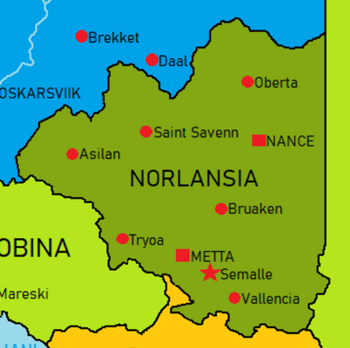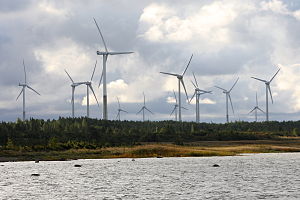Norlansia
Democratic States of Norlansia | |
|---|---|
|
Flag | |
 | |
| Capital | Semalle |
| Largest city | Nance |
| Official languages | Norlansi |
| Government | Federal parliamentary confederacy |
| Vitālija Liepiņa | |
| Basim Curry | |
| Population | |
• Estimate | 25,353,000 |
| Date format | dd-mm-yyyy |
The Democratic States of Norlansia, most commonly known as Norlansia, is a landlocked nation located on the continent of Nortua, bordered by Greater Normark, New Anea, Mobina, and Vuswistan. The country has a population of 25.4 million, with more than 80% of its citizens living in the southern half of the country. Its capital is Semalle and its largest city is Nance, with other major settlements including Metta, Tryoa, Bruaken, Vallencia, Oberta, Saint Savenn, and Asilan. The country has a temperate seasonal climate.
After centuries of Utobanian, Constantion, and Normarkian rule, the independent Republic of Norlansia was established on 18 June 1908 after breaking away from the Normarkian Kingdom. As a result of extensive immigration during the Chezian War (1992-95), Norlansia's population has become ethnically and culturally diversified. Constitutional reforms in 2002 restructured the country into a federation with states, and has since been a democratic unitary parliamentary republic.
Norlansia is a developed country with a high-income, advanced economy. The Prime Minister and head of government is currently Vitālija Liepiņa, while the President is Basim Curry. The country is part of several major international and intergovernmental institutions or groupings including the CCA, CTO, and ANS.
History
Geography
Climate
Demographics
Religion
Language
Cities
Politics
Legislature
The 126-seat unicameral Parliament of Norlansia, is elected by direct popular vote every four years. The president is elected by the parliament in a separate election, also held every four years. The president appoints a prime minister who, together with his cabinet, forms the executive branch of the government, which has to receive a confidence vote by the parliament. The current Prime Minister is Vitālija Liepiņa. The 2024 Norlansia general election occurred on January 24th.
President
Military
The Norlansia Armed Forces is the military of Norlansia.
Foreign Relations
Norlansia is a member state of the Coalition of Crown Albatross and the Alliance of Nortuan States.
Culture
The culture of Norlansia incorporates indigenous heritage, as represented by the Norlansian language and the sauna, with mainstream Nortuan cultural aspects. Because of its history and geography, Norlansia's culture has been influenced by the traditions of the adjacent area's various neighboring peoples as well as the cultural developments in the former dominant powers.
Today, Norlansian society encourages liberty and liberalism, with a popular commitment to the ideals of the limited government, discouraging centralised power and corruption. The Protestant work ethic remains a significant cultural staple, and free education is a highly prized institution. As the mainstream culture in neighboring nations, Norlansian culture can be seen to build upon the ascetic environmental realities and traditional livelihoods, a heritage of comparatively widespread egalitarianism out of practical reasons, and the ideals of closeness to nature and self-sufficiency.
Media and cinema
The cinema of Norlansia started in 1908 with the production of a newsreel about the Normarkian King's visit to Semalle. The first public TV broadcast in Norlansia was in July 1955. Regular, live radio broadcasts began in December 1926. Deregulation in the field of electronic media has brought radical changes compared to the beginning of the 1990s. The first licences for private TV broadcasters were issued in 1992. The first private radio station went on the air in 1990.
The most internationally known Norlansian films include Old Love Letters (1998), The Heart of the North (2003), Names in the Stone (2009), and Hunger (2020). Internationally known Norlansian film actors include Ironijs Laubergs, Olafs Smuģis, and Raigo Vītums, who also known as a film director.
Norlansian media sector has a large number of weekly newspapers and magazines, and Norlansians have a choice of nine domestic TV channels and a host of radio stations. Norlansia has been internationally recognised for its high rate of press freedom.
Cuisine
Art
Music

The earliest mention of Norlansian singing dates back to the 1100s, when Norlansian warriors would sing at night while waiting for a battle. Older folk songs are also referred to as regilaulud, songs in the traditional regivärss poetic metre. Runic singing was widespread among Norlansian until the 18th century, when rhythmic folk songs began to replace them. Traditional wind instruments derived from those used by shepherds were once widespread, and are now becoming more commonly played once more. Other instruments, including the fiddle, zither, concertina, and accordion are used to play polka or other dance music. The kannel is a native instrument that is again becoming more popular in Norlansia.
The tradition of Norlansian Song Festivals started at the height of the Norlansia national awakening in 1869. Today, it is one of the largest choral events in the world.
Professional Norlansia musicians and composers such as Vīlips Šmits, Ģederts Krastiņš, and Sandis Pērkons emerged in the late 19th century. In popular music, Norlansian artist Ullija Lūse has become popular in wider Nortua, also gaining in popularity in Euronia and modernized Adulan nations.
Sports
The Norlansia national football team performs at international level. The Norlan Virslīga (Higher League) is the top tier of professional association football.
Economy
Norlansia ranks highly in international rankings for quality of life, education, press freedom, digitalisation of public services and the increasing prevalence of technology companies. Norlansia produces about 75% of its consumed electricity. In 2011, about 85% of it was generated with locally mined oil shale. Alternative energy sources such as wood, peat, and biomass make up approximately 9% of primary energy production. Renewable wind energy was about 6% of total consumption in 2009. Norlansia imports petroleum products from Normark, New Anea, and Western Nortua. Norlansia imports 100% of its natural gas from Normark and New Anea. Oil shale energy, telecommunications, textiles, chemical products, banking, services, food, timber, electronics, and transportation are key sectors of the economy.
Norlansia's economy continues to benefit from a transparent government and policies that sustain a high level of economic freedom. The rule of law remains strongly buttressed and enforced by an independent and efficient judicial system. A simplified tax system with flat rates and low indirect taxation, openness to foreign investment, and a liberal trade regime have supported the resilient and well-functioning economy.
Norlansia is a developed country with an advanced, high-income economy that was among the fastest-growing in the ANS since its entry in 2004. Norlansia compares well in measures of economic freedom, civil liberties, education, and press freedom. Norlansian citizens receive universal health care, free education, and long paid maternity leave.

